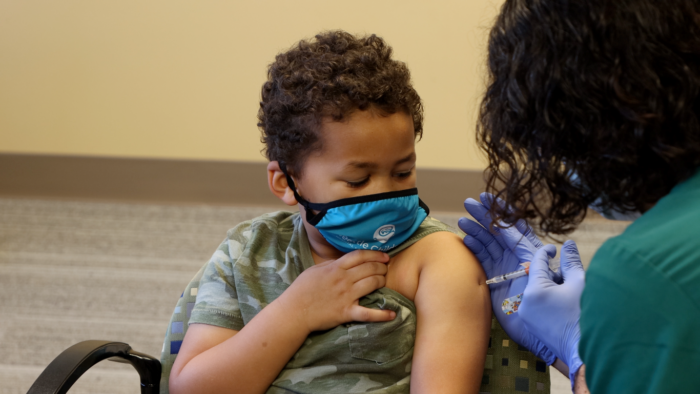Pediatric Infectious Disease Doctors Answer Parent’s Most Common Questions about Vaccines Under 5
7.7.2022 | Ashley Speller

Children between the age of 6 months and 4 years old are now eligible to receive the COVID-19 vaccine. For families who have long awaited the opportunity to vaccinate this age group, it’s a sigh of relief.
“It provides another layer of protection that we have been seeking for a long time now,” parent Michael Bamshad told KOMO news while attending Seattle Children’s vaccine clinic with his 4-year-old daughter Marlowe. “Everyone else has had the opportunity to get vaccinated and now it’s time for kids under five.”
For other parents with babies and toddlers, many are wondering what side effects to look out for with smaller children who cannot yet verbalize how they feel post-shot.
To help answer the most common vaccine questions, Dr. Surabhi (Sara) Vora, an Associate Professor of Pediatric Infectious Diseases and an Infectious Disease Physician at Seattle Children’s and Dr. Janet Englund, a Professor of Pediatrics and Infectious Disease Specialist at Seattle Children’s shared some expert insight.
What side effects can I look out for?
Generally, mild pain at the injection site is a common occurrence for children who are between the ages of two and five.
“For reaction site pain or swelling, it’s often best to cover the injection site with a long-sleeve shirt so they don’t have to see it,” Dr. Englund explained. “Give Tylenol if pain is interfering with daily activities but in general, distraction alone works well.”
Fever may also occur 24-48 hours after the vaccination but is typically resolved within one or two days. If needed, discomfort and fever can be treated with ibuprofen or acetaminophen.
“Fussiness on the day of or the day after the vaccine is a possible side effect, along with fatigue,” added Dr. Vora. “The side effects are mild and are fairly similar to what we saw with the older kids. With younger kids, they can’t tell us what they are feeling so we rely on parents recognizing the difference.”
Are the vaccines safe for kids so small?
Both doctors are confident in the safety and efficacy of the COVID-19 vaccines and even participated in the trials.
“I think we have abundant clinical data from clinical trials from both the Moderna and the Pfizer vaccine that these vaccines are safe for children under five,” said Dr. Englund. “They are also at a greatly reduced dose compared to the adult dosage of vaccine.”
In addition, the vaccines have been trialed in clinical studies at sites around the world, including at Seattle Children's, with very close observation from parents, physicians and by those involved in the clinical studies, who looked for reactions very closely.
“The level of rigor to these vaccine studies has been really high for these age groups. Kids tend to see minimal side effects. It's clearly very safe for children, even very young children,” Dr. Vora added.
Does my child really need the COVID-19 vaccine?
While the doctors note that even though kids do tend to get the disease at a lesser frequency in general, COVID-19 is still the number one vaccine-preventable disease in children.
“We still frequently see kids in the hospital with COVID-19,” Dr. Vora explained. “We've unfortunately had hundreds of deaths in children less than five in the U.S. since the pandemic started. It’s important to protect their health and mental health so they can participate socially and travel safely. The risks from the vaccine are much lower than the risks they face from COVID-19.”
Getting vaccinated is an important step in also decreasing the level of transmission in a family’s household since small children are often the transmitters because they cannot control their secretions, as well as older kids can and are often not able to wear their masks as effectively the way an adult would.
“We’ve been waiting such a long time for vaccines for these young kids, and they deserve the same protection.”